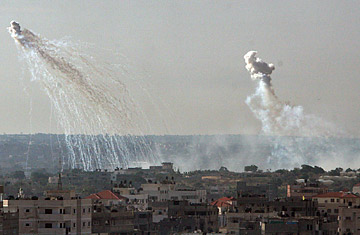
Smoke caused by explosions rises over Gaza City
"Fire Mountain" is almost an Arab town. Minarets spear the sky, houses lean against each other haphazardly, Arabic graffiti smears a few walls and broken cars litter the crooked lanes. But in fact it's an elaborate reconstruction tucked inside an Israeli military base close to Gaza. On Fire Mountain, Israeli reservists — normal men yanked out of comfortable lives at times of national crisis — get last-minute instruction on how to storm a house: one soldier lobs a grenade into a doorway while another scans the rooftops nearby for snipers.
These will be the tactics if Israel decides to launch "Phase Three" in Gaza, a thrust into the heart of the besieged Palestinian enclave by thousands of troops. Phase Three seems inevitable now that Israel and Hamas have both rejected a United Nations ceasefire call and a French-Egyptian peace proposal. "All that's left to do is to give the order, and we'll start moving in the direction of the Gaza Strip," a commander of the reservist battalions told the Israeli daily Ma'ariv. On Saturday, Israeli planes dropped thousands of leaflets warning of more fighting to come. (See photos of the chaos in the Middle East)
What awaits is warfare at its worst. Hamas fighters will try to draw Israeli troops into congested city neighborhoods where they'll face suicide-bombers, snipers, roadside explosives and any number of other gruesome tricks — all of it in alleys and buildings swarming with fearful Palestinian families. On the Israeli side, reservists — who make up more than 5% of the Israeli fighting force — will bear part of the brunt. In one Fire Mountain unit, there's a gardener, a lawyer, an ad exec, an electrical engineer and a redheaded Israeli-American actor from Beverley Hills named Gregory Ross. "I'm so not into thrill seeking," says Ross. "But I'm here to protect my people."
A pony-tailed computer expert named Amit, 32, who is returning to his old infantry unit says: "Its very strange, going from civilian life, and being with my kids, to pointing guns and thinking about killing." He adds: "I can't say I'm not scared."
Leaving home for war duty was a wrenching experience for reserve officer Ariel Seigelman. A youth counselor, he and his wife were savoring their first trip to a café after the birth of their son when Seigelman's cell-phone rang. He recognized the caller's number as the Israeli Defense Forces. "Your nation needs you," an unknown voice said.
"As soon as my wife saw me take a deep breath, she knew it was from the army, that I was being called up for Gaza. And she started crying," says Seigelman, 30, a wiry reserve officer who has faced combat before. "She didn't want me to go. Our baby is only a month old." For Seigelman, there was never any doubt; "I knew what I was in for, but it has to be done," he says grimly.
As Palestinian casualties rise — by Sunday over 860 had died in the fighting compared to 13 Israelis — worldwide cries for a ceasefire are reaching a crescendo. But in Israel, nearly everyone supports the war, in large part because every Israeli knows someone who has been called up to fight, or someone who lives within range of Hamas' rockets.
The mood was similar at the start of the 2006 war against Hizballah in Lebanon, but soured when it became obvious that Israeli politicians and generals were bungling the war, and that soldiers' lives were being needlessly lost. That hasn't happened yet, but already a few retired generals are starting to complain that Prime Minister Ehud Olmert and his cabinet are dithering. Says former National Security Council Chief Maj. Gen. Giora Eiland, "Either reach a cease-fire in two to three days, or start a big military operation that will take at least two weeks. We've been beating around the bush for a week, and we need to make a decision now."
Inside their tents, reservists banter about wives, girlfriends, or jobs — anything but what awaits them in Gaza. Once they cross over, the soldiers are forbidden from calling home on their cell phones. "So after I go in, the next call my wife gets will either be from me telling her I'm safe, or from the IDF," says Seigelman.
From Fire Mountain, black plumes of smoke are visible over Gaza, the result of the latest Israeli air strikes. In a matter of days, or hours, the reservists could be ordered into the war zone. It is not something they relish. But, they say, Israel's security is under threat and must be defended. "We have nowhere else to go. Even if our land is burning, it's still ours," says a soft-spoken reservist named Noam, a TV producer in civilian life. He tells me: "Do me a favor, OK? Tell your readers that we're just normal guys caught in an impossible situation."
—with reporting by Aaron J. Klein/ Gaza border
